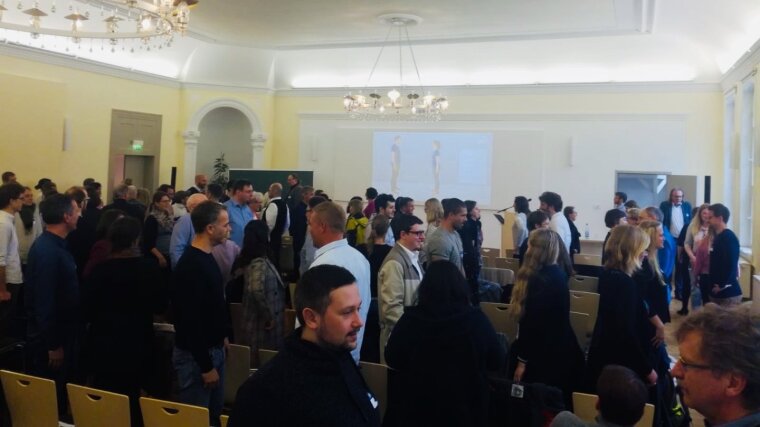
Why should you activate your students already in the lecture hall?
Pressure to perform and time pressure promote the tendency towards predominantly sedentary activities, a sporting inactive leisure time and a lack of motivation to move. [1]
- During their studies, the average student gains about 2-3 kilograms in body weight. [2]
- Around 46% of all students do no sport or less than 60 minutes of sport per week. [3]
- Students sit for up to 9 hours a day, one of the longest hours of any working professional group. Sitting time in the lecture hall, library and at home adds up to a significant health risk factor. [4]
If we want to prevent this, we need to increase physical activity and reduce sitting time already in the lecture hall!
Why should you relax your students already in the lecture hall?
Performance and time pressure, long exam periods and fears about the future are common stressors that a large proportion of students are exposed to.
- 53% of students report a high level of stress.
- In addition to university-related stressors such as exams or final papers, the search for accommodation, part-time jobs and fear of failure play a not insignificant role. [5]
- Constant stress promotes illness, leads to susceptibility to infections, burn-out or sleep disorders. It also increases your risk of alcohol, drug and medication abuse.
If we want to prevent this, we have to inform about possibilities of stress reduction already in the lecture hall and enable points of contact to interventions
Why should your students already do concentration exercises in the lecture hall?
Studies show a decrease in concentration, performance, mood and interest in the course of a lecture.
- Löffler et al. (2011) were able to show that the heart rate steadily decreases over the course of a 90-minute lecture and reaches its lowest point after 45 minutes. [6]
- Permanent sitting and the associated lack of movement are also frequently the cause of nervousness/restlessness, neck/shoulder pain, low back pain and headaches. [7]
If you would like to prevent this and increase the students' ability to learn, then simply try our breaks and decide for yourself!
-
Bibliography
[1] Göring, A., Möllenbeck, D. (2015). Bewegungsorientierte Gesundheitsförderung an Hochschulen. Göttingen: Allgemeiner deutscher Hochschulsportverband.
[2] Kemmler, W., Kohl, M., Bebenek, M. & von Stengel, S. (27. März 2015). Entwicklungen von Übergewicht und Adipositas im jungen Erwachsenenalter – Stellenwert berufsbedingter Veränderungen des Sporttreibens auf Fettmasse, fettfreie Masse und Körpermasse bei Studenten. Wiener Medizinische Wochenschrift, S. 107-115.
[3] Bollmann, U. (02. Juli 2015). Wir gehen von der Bewegungs aus. Aachen, Nordrhein-Westfalen, Deutschland.
[4] Wallmann-Sperlich, B., Bucksch, J., Schneider, S. & Froböse, I. (2014). Risikofaktor Sitzen. Prävalenz und Determinanten von Sitzzeiten am Arbeitsplatz. Stuttgart: Thieme.
[5] Herbst, U., Voeth, M. & et al. (2016). Studierendenstress in Deutschland – eine empirische Untersuchung. Berlin: AOK Dachverband
[6] Löffler, S. N. / Dominok, E. / Haaren, B. von / Schellhorn, R. / Gidion, G. (2011): Aktivierung, Konzentration, Entspannung : Interventionsmöglichkeiten zur Förderung fitnessrelevanter Kompetenzen im Studium. Karlsruhe: KIT Scientific Publishing, Stand: 24/02/2012.
[7] Meier, S. / Mikolajczyk, S. / Helmer, M. K. / Steinke, B. / Krämer, A. (2010): Prävalenz von Erkrankungen und Beschwerden bei Studierenden in NRW. Ergebnisse des Gesundheitssurveys NRW. In: Präv Gesundheitsf 5 (3), 257–264.
Preferences and motivation are often heterogeneous among your students. Feedback and participant size vary accordingly. Do not be irritated by first negative experiences or staying seated. Active breaks are new territory for most students and there is a fear of embarrassment.Our experience shows that the use of break videos depends, among other things, on the way the lecturer integrates them. In the event of technical faults or negative feedback on video content, remain positive and emphasise the voluntary nature of the offer. It is everyone's responsibility to take care of their own health and you are providing a special service within your course.
Feedback
Image: DAB
As we are continuously working on more breaks for you, we are very happy to receive your inspiring, stimulating, critical, exhilarating.... - anything!
DAB Team: Sven Jaekel & Josephine Schwadt
E-Mail: dabei@uni-jena.de
